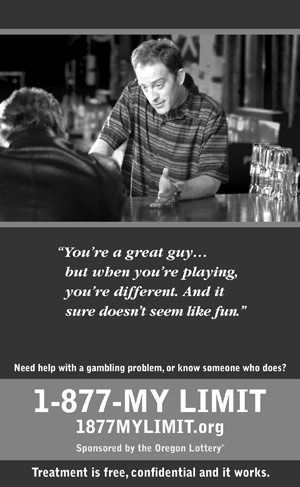 Gambling is, for many, an invisible addiction. While it's true that only a small number of people suffer from out of control, or "pathological" gambling, that small group heavily impacts their family, friends, neighbors — everyone around them.
Gambling is, for many, an invisible addiction. While it's true that only a small number of people suffer from out of control, or "pathological" gambling, that small group heavily impacts their family, friends, neighbors — everyone around them.
Experts say that African Americans are more likely to be caught in the grip of gambling addiction, and LifeWorks Northwest is working to bring in more area residents to an array of programs designed just for them.
The Skanner recently sat in on a chat by three recovering gamblers and their counselors. The group shared their concerns about the lack of awareness on how video poker, scratch cards, Powerball tickets, and trips to Spirit Mountain are bleeding cash out of area households – money meant to buy groceries and pay the bills.
"I'm a senior citizen and like a lot of senior citizens, socializing when I was growing up was around gambling," said Anita, who asked that only her first name be used. "We learned to play cards at an early age – bid whist, Hearts — but it started out with the family."
Johnetta Burkett, coordinator for LifeWorks' problem gambling program since 2001, counted back the decades to a place where her whole neighborhood gathered around dice games.
"Years ago on Vancouver and Mason there was a log – a big telephone pole," she said. "People would go over there and socialize and gamble and they would shoot craps; it was a daily thing, it was a gathering place for people."
"Nobody thought about the effect it was going to have on their family," Anita said. "And when gambling came to Oregon we voted for it, it was going to make the taxes go down, it was going to pay for education – but we're losing all of that.
"Problem gambling became a bigger issue with the advent of video poker games," Anita said.
A 1997 report to the Oregon Gambling Addiction Treatment Foundation noted that, when the Oregon Lottery started offering video poker in 1992, the state mandated that three percent of its gross revenues be used for treatment programs for video poker addicts. A variety of other rules were set, including payout limits and a requirement that any video poker establishment must have an alcohol license.
However a 1994 lawsuit filed by Ecumenical Ministries of Oregon inadvertently led to the elimination of funding for gambling treatment programs, as the set-asides were ruled to be a violation of the state constitutional amendment that all lottery revenues fund economic development.
| LifeWorks NW offers meetings twice a week for African and African American focused gambling addiction support services: Gamblers Anonymous meets Tuesdays from 2-3:30 p.m. and Saturdays from 9-10:30 a.m. GamAnon, a support service for family members, meets Saturdays from 9-10:30 a.m. |
Eventually the state legislature voted to pay for the programs from the state general fund, instead of taking the money from video poker profits.
Burkett says 40 to 50 percent of the people who access gambling addiction services through LifeWorks' African American-focused program also have another addiction.
"Alcohol is one, and more recently, you have people addicted to stimulants like cocaine," she said. "'Video crack' is especially damaging to the community."
"I still live in the clean and sober environment, but I live with a man who goes to the video crack, and he doesn't understand why he never has any money," said Martin, who also asked not to be identified. "He might put in a hundred dollars today, then go in three days and put in a hundred dollars and win $400, but then go in and lose $400."
Rhonda Solomon is celebrating one year off gambling, as of this week.
Over the years, Solomon said, she's struggled with several addictions, and come through them all. The most important step is understanding the nature of the problem.
"There has to be a conviction, there has to be an understanding," she said. "First of all you have to understand this is an addiction. First you have to get people to understand what an addiction is.
"I didn't realize I was so addicted to gambling until it affected somebody else," Solomon said. "I cheated, I lied, I stole, and the person I took advantage of gave me the choice of death, or treatment.
"That's the only reason I'm here today," she said. "I was in with $8,000, but that was the same to me as $150,000."
LifeWorks offers a blanket of recovery services for people of all ages and genders, including family members who may not have addictions themselves but are living with someone who does. Counseling, training and social sessions are free by calling 10877-MY-LIMIT (1-877-695-4648). Ask for African or African American-specific treatment providers.






















































































































































































































































































































